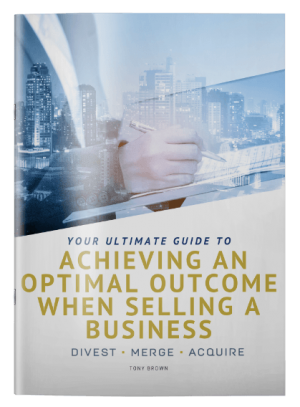When a client or colleague seeks advice on selling their business or sourcing acquisition targets, assistance is typically provided by referring them to those best placed to assist.
Without prior experience in the area, referring them to a suitable advisory firm that will best meet their needs can be quite challenging.
This article contains the key questions to ask of any M&A advisory firm.
EXPERIENCE
Does the firm have a record of successful transactions of comparable size?
- What is the value of total transactions the firm has advised on? This should preferably run into the hundreds of millions of dollars.
- What is the target enterprise value range of clients the firm has advised on? The largest? The smallest? What is the average transaction value?
CREDIBILITY
Are the key advisors suitably qualified and experienced?
- Does the advisory team include qualified, expert professionals with a wealth of experience in corporate advisory, business management and transactions?
PROJECT MANAGEMENT
Will the advisors personally oversee the project?
- Will at least one of the firm’s advisors be involved with the project, ensuring personal attention and backup?
CONFIDENTIALITY
Does the firm understand, respect and manage client confidentiality?
- Are processes conducted on a confidential basis, where discretion and sensitivity in marketing and negotiations are required to minimise risk and disruption to the business?
- Are prospective purchasers thoroughly qualified and are they required to complete a confidentiality agreement and investor registration?
- Is client approval sought before every purchaser receives further information about the business?
- How does the firm manage these processes? Is it done systematically, so all team members involved in the project must adhere to the procedure?
REGULATORY
Does the firm hold the appropriate licenses?
- Does the firm and its advisors hold appropriate licenses?
MARKETING RESOURCES
How does the firm source target purchasers?
- What marketing resources does the firm have access to?
- What ongoing costs will be expected to contribute?
- How will the firm contact target purchasers?
- How will the firm make non-target purchasers aware of the opportunity?
PRESENTATION
Will the firm professionally present the business opportunity?
- Does the firm prepare a sophisticated and comprehensive Information Memorandum (IM)? This is a pivotal element to marketing a business, as it is designed to provide purchasers and their advisors with sufficient information to make an initial assessment, as well as build their confidence to proceed with the acquisition.
- Does the firm, as part of its process, analyse the business for its strengths and potential and make recommendations on any aspects which could be improved to maximize the perceived value of the business to interested parties?
- Does the firm require the client’s written approval of the content of the IM?
COMMUNICATION
How well does the firm communicate with clients?
- Does the firm provide high levels of communication and advice throughout the sale process so clients can make informed decisions?
- Is the firm fast-acting and highly responsive in communication with clients and their other advisors, ensuring a smooth process to completion?
- Does the firm document all correspondence and events regarding the sale?
- Does the firm provide regular written and verbal reports of activity and progress, including details and status of every prospective purchaser?
COOPERATION
How well does the firm cooperate with other professional advisors?
- Are the firm’s advisors professionally qualified and do they work seamlessly with clients’ other advisors?
PRELIMINARY VALUATION
Will the firm provide an indicative valuation before the client commits?
- Does the firm provide an indicative valuation of each business before a client commits to proceed to market?
PROCESS TO COMPLETION
Does the firm manage the full process to completion?
- Qualifying Prospective Purchasers, to minimise risk and lost time: Do they assess purchasers’ ability to complete the acquisition and consult clients every step of the way?
- Questions: Do they coordinate the question and answer process to maintain protocols, confidentiality, accuracy, and documentation, as well as provide feedback and advice?
- Inspections: Do they coordinate and attend inspections and other meetings and make recommendations?
- Expressions of Interest evaluation process: Do they assess and rank offers? Assess capacity to finance the transaction? Assess the commitment and ability of interested parties to complete the transaction? Assess strategic fit?
- Negotiation and Completion: Do they capitalise on competitive tension? Focus on value drivers to improve price negotiations? Liaise with legal and accounting advisors? Assist with negotiating warranties, indemnities and guarantees? Assist with Letter of Intent or Heads of Agreement as appropriate?
- Due Diligence: Do they coordinate and facilitate the due diligence process, including establishing and managing virtual data rooms? Do they understand how the various components of working capital requirements interact, and can they map these out in detail?
- Contract terms: Do they understand the various key components and differences between share and asset transactions? Where appropriate, brief or provide the lawyer with a pro-forma Contract of Sale to save time and cost? Negotiate the commercial aspects of the contract of sale?
How Does DMA Measure Up?
DMA is an M&A advisory firm that meets or exceeds all the above criteria. Here are some examples of how:
- Most of DMA’s transactions are in the $3M-$100M+ range.
- DMA’s team consists of qualified, expert professionals with a wealth of experience in corporate advisory, business management, and transactions. They are complemented by an experienced, capable team responsible for the distribution of client marketing material and screening of initial responses.
- DMA and its Member Firms hold the necessary license appropriate to their home State.
- DMA’s database is the primary source of prospective target firms. The database covers all organisations in Australia with more than 10 employees and corporate, private and international investors, allowing it to readily identify and target prospective purchasers. It is understood to be one of the best sources of business intelligence available and is a key point of difference.
- Over 80% of purchasers for businesses have been sourced from DMA’s database or DMA’s website.
- DMA prefers to provide an indicative valuation of each business before a client commits to proceed to market.
- DMA manages the entire process, from start to completion.
FIND OUT MORE
DMA can provide a Divestment Proposal containing information to assist prospective clients in understanding more about the process.

